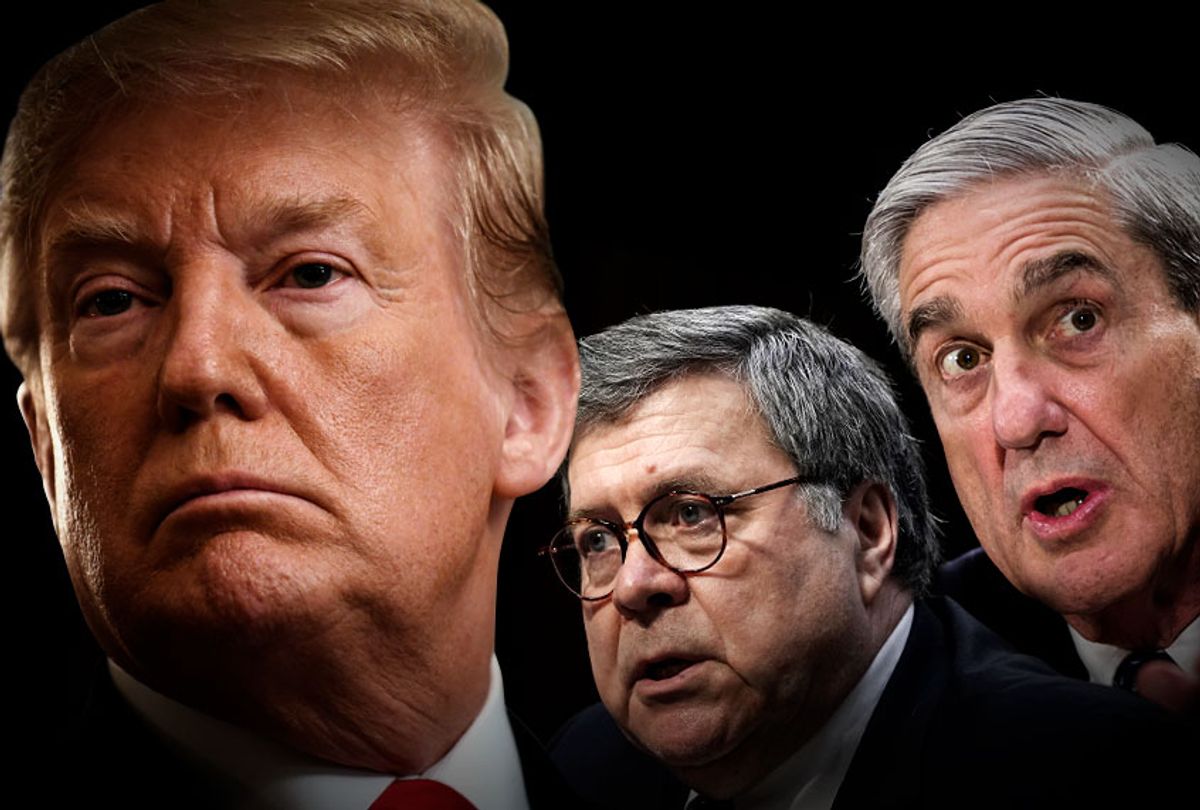President Donald Trump asserted privilege over special counsel Robert Mueller's full report on Russian interference in the 2016 presidential election, escalating a standoff with Congress that appears to have no end in sight.
The move came shortly before the House Judiciary Committee began contempt proceedings against Attorney General William Barr for failing to comply with a subpoena to provide lawmakers with an unredacted version of Mueller's 448-page report, as well as the report's underlying evidence.
Assistant Attorney General Stephen Boyd notified Judiciary Chairman Jerry Nadler, D-N.Y., of the development in a letter Wednesday morning.
"We are disappointed that you have rejected the Department of Justice's request to delay the vote of the Committee on the Judiciary on a contempt finding against the Attorney General this morning," Boyd wrote to Nadler.
"Accordingly, this is to advise you that the president has asserted executive privilege over the entirety of subpoenaed materials," he continued.
The White House insisted in a statement that Trump had "no other option" other than to invoke executive privilege.
"Faced with Chairman Nadler's blatant abuse of power, and at the attorney general's request, the president has no other option than to make a protective assertion of executive privilege," White House press secretary Sarah Huckabee Sanders said in a statement.
The Democratic chairs of several congressional panels have ramped up their investigations into the Trump administration and the president's business entities in the wake of Mueller's report. At the same time, the administration has vowed to "fight all the subpoenas" from the legislative branch and to block congressional investigators from moving forward with their probes.
The White House's stonewalling has escalated congressional Democrats' calls for impeachment. Whether this is a calculated strategy by Team Trump designed to provoke such a reaction is anyone's guess. What is clear is that the president's claim of executive privilege deepens the fight between the White House and Democrats over the issue of congressional oversight.
The White House this week missed the third deadline imposed by House Democrats to hand over Trump's tax returns. Trump on Tuesday also instructed former White House counsel Don McGahn not to turn over documents to the Judiciary panel. Over the weekend, he said Mueller should not testify before Congress.
The Judiciary panel's contempt vote on Wednesday follows the Justice Department's failure to meet several deadlines to turn over a copy of Mueller's unredacted report, as well as the underlying documents. House Democrats have argued they are entitled to view all of Mueller's investigative materials as part of their oversight and investigative authorities.
If the Judiciary committee signs off on the contempt resolution, it will go to a vote in the full House. The timing of that vote would then be determined by Speaker of the House Nancy Pelosi.
In a 27-page report released Monday, the House Judiciary panel outlined why it is demanding Mueller's full report — and mentions the prospect of impeachment.
"[T]he Committee needs to review the unredacted report, the underlying evidence and associated documents so that it can ascertain the facts and consider our next steps," the report reads. It says the findings may warrant legislative action or other steps, including the approval of "articles of impeachment with respect to the president or any other administration official, as well as the consideration of other steps such as censure or issuing criminal, civil or administrative referrals."
Nadler on Monday said he would consider postponing Wednesday's contempt proceedings if the Department of Justice "presents us with a good faith offer for access to the full report and the underlying evidence."
Rep. Doug Collins, R-Ga., the top Republican on the House Judiciary Committee, responded to Monday's news by accusing Nadler of "smearing" Barr as a result of being unhappy with the results of Mueller's report.
"Chairman Nadler knows full subpoena compliance requires Attorney General Barr to break the law. Yet, instead of introducing legislation allowing the attorney general to provide Congress grand jury material, Democrats move to hold him in contempt," Collins said in a statement, blasting the move as "illogical and disingenuous."
The Justice Department has stated that revealing grand jury material in response to congressional oversight requests was prohibited by federal secrecy rules in the absence of a court order, but Nadler has argued that courts have disclosed grand jury material to Congress under the "judicial proceeding" exception in the past.
Barr last week refused to testify before the House Judiciary Committee, rejecting committee members' plans to have a counsel question him alongside lawmakers. The move angered Democrats, nudging them closer to holding the attorney general in contempt of Congress.
In the contempt resolution, Nadler highlighted the ongoing threat of Russian election interference as one of the reasons Democrats were seeking to view the complete version of Mueller's report. Sections of the publicly-released version of Mueller's report detailing the actions of Russia's "Internet Research Agency" (IRA) and other Russian hacking operations "contain significant redactions, which impair the ability of the Committee to gain a complete understanding of Russia's actions," the contempt report states.



Shares